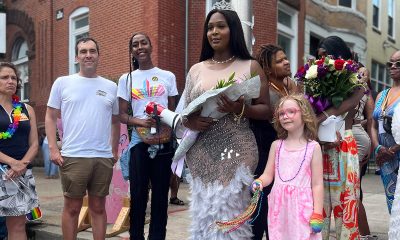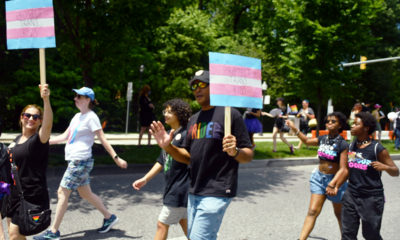a&e features
John Waters is never wrong
In new book, the ‘filth elder’ has an opinion on just about everything
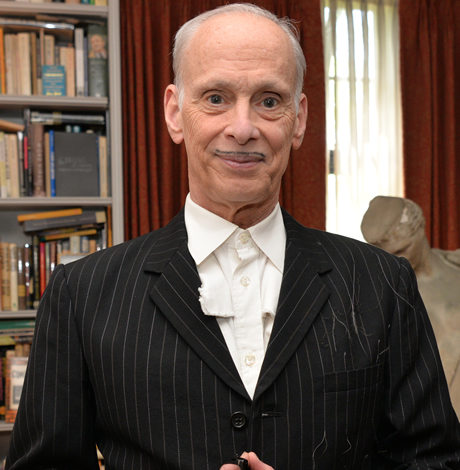
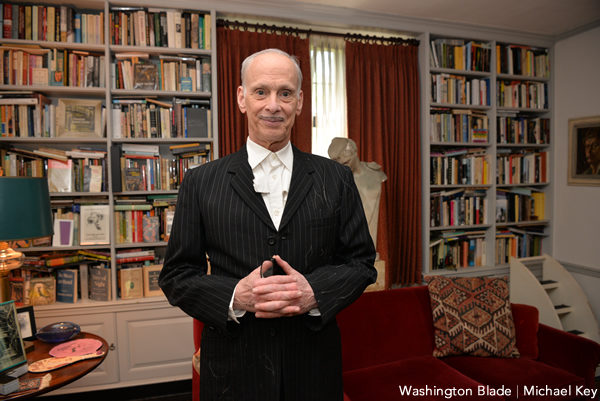
John Waters has had underwhelming meals in overpriced restaurants — so you don’t have to.
He’s been caught in long airport security lines. He’s taken the BoltBus to New York City and been delayed while the driver took a dump in the on-board restroom. He’s had to sit in a doctor’s waiting room with an embarrassing ailment and been barraged with questions from other patients who recognize him and demand to know what he’s got.
Now the Baltimore-based filmmaker and writer, who just turned 73, has put all of those experiences and more into a book of opinions and advice, presumably so people won’t have to endure what he has. Called “Mr. Know-It-All: The Tarnished Wisdom of a Filth Elder,” it’s his ninth book, and it comes out on May 21. He’s described it as “my opinion on everything” and “how to avoid respectability at 70 years old.”
When it comes out, readers will discover that “Mr. Know-It-All” isn’t just a book about coping with life’s indignities and humiliations, even though there’s plenty of guidance about that. It’s also part memoir, part celebrity tell-all and part movie industry guidebook with separate chapters about each of his last seven films, all filmed in Baltimore (“Polyester,” “Hairspray,” “Cry-Baby,” “Serial Mom,” “Pecker,” “Cecil B. Demented” and “A Dirty Shame.”)
The book is filled with anecdotes about many of the actors he’s worked with, including Kathleen Turner, Johnny Depp, Tracey Ullman and, of course, Divine. There’s the time Waters turned down Brad Pitt at an audition for “Cry-Baby” because Pitt was too handsome to be cast as Depp’s sidekick, a decision that he thinks makes him perhaps “the only director who ever said no to Brad Pitt.” He remembers that Rikki Lake lost her virginity halfway through “Cry-Baby;” how he called Tab Hunter out of the blue to star in “Polyester” and how he battled with motion picture censors to let him use the word “Pecker” as a movie title.
Other readers may be drawn to his essays about non-cinematic subjects, which range from art collecting and Brutalist architecture to Yippie protests, Andy Warhol and taking LSD at 70. In one chapter, he names the one female he has adored since childhood. In another, he imagines returning to the apartment he lived in during the 1960s, a sign that, in some cases, you can go home again (especially when you still live in the town where you grew up).
“Mr. Know-It-All is here to tell you exactly how to live your life,” he writes early in the book. “I’m never wrong.”
Though the title says it’s a book of wisdom, this is not a rehashed litany of someone else’s platitudes. All the advice he offers grows out of his own experiences. As a result, readers gain insights into the maker of “Pink Flamingos” and “Female Trouble” by learning what he’s gone through and how he dealt with it.
One of those insights is that Waters can be quite frugal and down to earth. He not only takes the inexpensive BoltBus to New York but also goes to a Laundromat when he spends the summers in Provincetown. (And of course, he hitchhiked across the country and wrote about it in his bestseller, “Carsick.”)
In many of his stories, Waters reveals a knack for handling even the most humiliating situations with humor and aplomb. He also says he licks important packages before he puts them in the mail — “to remove any ‘curse’ of show business rejection” — and instructs his staff to do the same. In the LSD chapter, he mentions texting “my boyfriend,” whom he never names.
Next week, Waters begins a national tour to launch his book, published by Farrar, Straus and Giroux. East Coast stops include Barnes and Noble’s Union Square location in New York City on May 21; Politics and Prose Bookstore in Washington (the 5015 Connecticut Ave., N.W. location, with first-come, first-served seating) on May 24 at 7 p.m. and a book signing at Atomic Books, 3620 Falls Road in Baltimore, on May 25 at 7 p.m.
West Coast stops include ticketed events at The Green Arcade at the McRoskey Mattress Loft, 1687 Market Street in San Francisco on May 30 at 7 p.m., and Book Soup at The Renberg Theatre (Los Angeles LGBT Center’s Village), 1125 N, McCadden Place in Los Angeles on June 1 at 7 p.m.
Waters recently sat down at his home for an interview with the Washington Blade to talk about his book and his life as a filth elder. The interview has been condensed.
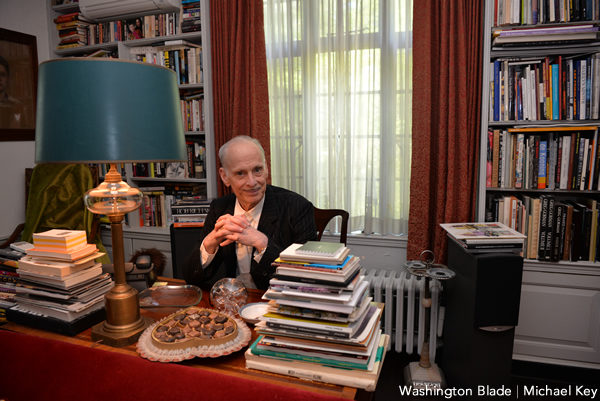
WASHINGTON BLADE: A good alternative title for your book would be “The Influencer,” don’t you think? How To Win Friends and Influence People 2?
JOHN WATERS: I’m Norman Vincent Peale, you’re saying?
BLADE: You do give a lot of advice: Come up with a gimmick. Have backup plans. Get at least one other person to believe in you. Sound advice, with a John Waters twist.
WATERS: I agree with that totally.
BLADE: Why an advice book?
WATERS: Well, I always kind of parody things, so I thought an advice book coming from me would be kind of a parody in the first place. I needed that kind of genre to be able to talk about all the things I wanted to talk about.
In some ways it’s like “Shock Value” because “Shock Value” ended right before we made “Polyester,” so this has the rest of the movies in it. But I also wrote it from a viewpoint of how to tell young filmmakers how to deal with Hollywood and what happens and all that kind of stuff, and how you fail upward. And then the other subjects I had to put in about love, about fashion, about art, about death, about every possible thing. But to talk about them all, you need a theme that runs through the whole thing, so that’s how I came up with [giving] advice.
Do I expect every person to follow my advice? No, but I believe that I gave good advice. It’s not really told ironically. I believe everything I say in it. But I hoped to write a humorous book at the same time.
BLADE: Who are you giving advice to?
WATERS: I’m giving advice, first of all, to the people that like my work, because they’re hopefully the first people that buy the book. Secondly, even if you don’t know anything about me, I’m giving advice to younger people about how to handle what’s coming, failure and success, in your life if you’ve chosen to be in the arts in any way. So I think I’m trying to give advice to anybody probably younger than me, because older than me are dead, you know. And I tell you how to beat that too.
BLADE: You’re not writing just for the hardcore fans?
WATERS: No, not at all. If you’re never seen any of my movies, you can still read the book.
BLADE: A lot of your fans may be the “others” in society, those who don’t fit in or conform, the people in “Desperate Living” and other movies.
WATERS: The people that used to be the “others” in society are often now the leaders. Everybody wants to be the “other” now. They didn’t used to. Even Trump would probably want to be an outsider. Obama thought he was an outsider. Everybody wants to be an outsider, and I want to be an insider. I said that in “Make Trouble,” that it’s more fun to cause trouble from within. Which is what “Hairspray” did.
BLADE: But a lot of the others aren’t the ones who would typically be disposed to take advice.
WATERS: Maybe from me they might.
BLADE: Why should someone follow your advice?
WATERS: You don’t have to. I think you could read the book and not follow one bit of it and still enjoy the book. You don’t have to. I don’t expect anybody to, really.
BLADE: Your advice grows out of your experiences. It’s not warmed-over Norman Vincent Peale. And because it comes from within, your advice in turn provides insights into you.
WATERS: I always thought that is a joke, that book, which I probably never read. But my parents had it and it was such a thing then that it became a joke in a way. That same title could apply to this book.
BLADE: The other thing about your advice is, you chronicle all the ways you’ve suffered indignities. You’ve had bad dinners at good restaurants. You’ve had bad seats on international flights. You’ve been harassed at the doctor’s office.
WATERS: I’m also saying all the wonderful things that happened to me. So basically, there are different kinds of problems. It is a high-class problem to worry about being recognized in a doctor’s office. It’s the one time that it’s really bad to be seen. Although, if you weren’t [famous], you wouldn’t have gotten the appointment. So in the long run, it isn’t bad.
BLADE: Do bad things happen to you more than most, like Joe Btfsplk in “Li’l Abner?”
WATERS: No. I say in the book, not one bad thing has ever happened to me from being famous, in any way. It really hasn’t. I mean, high-class problems, some of the things I talk about. But, generally, I can bitch about flying all the time. Bitch about first class, which is really bold. But I get to fly all the time and I don’t pay for it. But I’m working, you know? So I’m trying to tell people that when bad things happen to them, they can use it and how they can appreciate it and how they can look back on it and it doesn’t mean really anything terrible.
BLADE: You bring up all these universal things that anybody can identify with and you’ve come out on the other side, none the worse for wear from the indignities you’ve suffered.
WATERS: Everybody has indignities.
BLADE: Are you more sensitive to things than others?
WATERS: No, I don’t think so. I think I notice them more and it’s more, like, ludicrous, some of the problems that you get from being known.
BLADE: And then you use it for comic relief.
WATERS: Yeah, comic relief. In my own life, even.
BLADE: Is there one disappointment that tops them all?
WATERS: I only regret one thing, smoking cigarettes. It’s the only thing I regret in life. Because I’ll probably die from it. I mean, I don’t have cancer, but I’m just saying that, both my parents died from some form of cancer. They were 90 though. They had a long, good life. So, yes, I regret smoking cigarettes.
BLADE: You lived through all these indignities, and that’s a sign that others can too.
WATERS: The other day in New York somebody yelled at me, a homeless person, ‘You’re still alive?’ Which really made me laugh. I thought, ‘Well, yes I am, are you?’
BLADE: You and the Queen of England ought to compare notes.
WATERS: She probably has some really good ones.
BLADE: On your book tour, you’re appearing at Politics and Prose in Washington. Is this book political?
WATERS: Sure it is. All humor is political. And this book, definitely. I have a whole chapter, ACT BAD, which is really [suggesting ways] to go further than ACT UP did. I think comedy is political, trying to get you to laugh at things. I think every chapter in this book is political. But the worst way you can be political [is to] rant. If you get people to laugh, they’ll listen. If you lecture, in a strident tone, like Elizabeth Warren, no one will pay attention. Even though I totally agree with her politics, I hate to hear her talk. She’s never said a funny thing in her life. So the thing is, it’s important, if you want to change people’s minds, to make them laugh. It’s the first way to get their attention.
BLADE: What will you be doing at Politics and Prose?
WATERS: Well, probably a conversation with somebody and read a chapter and sign books. Like what I do everywhere. It’s always “a conversation with.” It’s basically a free lecture tour.
BLADE: As opposed to Atomic Books in Baltimore, where it’s primarily a book signing.
WATERS: That is usually the biggest one in the whole country, which is pretty amazing. That tiny bookshop, on the last two books, I think, sold even more than Barnes and Noble in New York.
BLADE: For your “Carsick” book-signing there, it was raining and the line was around the block.
WATERS: That bookstore, I get all my fan mail there. It’s really a great place, so I’m all for it.
BLADE: Does your book have any bombshells in it? Landing Tab Hunter for “Polyester?” Not casting Brad Pitt when he auditioned?
WATERS: That’s not up to me to say. The only thing I could think in there, maybe, is the [taking] LSD thing, in a way. That’s the stunt of the book. That’s something that I did that I thoroughly enjoyed. I think if there’s a sentimental chapter in the book about friendship, then maybe that is that. If I had known how strong the LSD was that I took, I probably would have been uptight. But I didn’t and it was great. I spent eight months getting the right acid from the purest source I could find, practically from Timothy Leary’s asshole. The Blade can print that. But the provenance of it was high and it was great. I don’t have to ever do it again. Just like I don’t have to ever hitchhike across the country again. Why would I? I did it. I don’t know if that’s newsworthy, but that would be, maybe.
BLADE: You had a big build-up about it in the book: We don’t know what this is going to do to us. And then you stopped hallucinating and it was OK and the sun rose…
WATERS: It was more than OK. It was great. I never had a bad experience when I was young, or I probably would have never done it. What I wanted to see is, what is it like to do it now, when I’m 70 years old? I certainly would never imagine that many 70-year-olds try to take acid. Especially if you haven’t done it since you were young.
BLADE: Do people still take LSD?
WATERS: Oh yeah. All the young people now do micro-doses. All the people that work in Google. All the tech kids take teeny doses of it. But not many 70-year-olds take it. People I know don’t take it.
BLADE: You write that you tried to get transgender pioneer Christine Jorgensen in a movie. That’s something probably a lot of people don’t know. You’ve sprinkled in all kinds of things that are going to be part of your lore.
WATERS: There are lots of things that people don’t know. But I don’t know that that means it’s Stop the Press. Most everything in the book is probably new information to most people.
BLADE: Who do you wish had been in one of your movies but never was?
WATERS: Always Meryl Streep. But I would have had to stop her from doing a Baltimore accent. And she would have done it brilliantly.
BLADE: Did you have a part for her?
WATERS: You know, at times, any of those movies she could have been in, yeah. We’ve met before, maybe a couple of times, at parties. She’s lovely. But she didn’t say, “Oh, I’ve been dying to work with you.”
BLADE: Roseanne Barr has come up.
WATERS: Well, Roseanne, when I dealt with her, she was a liberal. Completely. Yes, she came up a couple of times. I was friendly with her.
BLADE: For “Serial Mom?”
WATERS: Yeah. “And A Dirty Shame.” She was possible for that at one point. So, I was always friends with a liberal. I did her show and everything. Traci Lords was on her show. Who knows? I don’t know. I guess she’s just on the Internet too much.
BLADE: Who was the greatest delight to work with?
WATERS: They all were a delight, in a way. I mean, making movies is horrible. I say that in the book. Basically, it’s not fun, because there’s so much pressure and you have to do something every day and we’re not going to get this shot and it’s going to be over budget. But they all were team players. That’s what I can say they were.
Somebody said about my mother after she died: She was game. And they were game. They had to be game, to come with us, come to Baltimore, especially joining a group of people that had known each other for 30 years, a lot of them. I didn’t have any trouble with any of them. They were pros. But we were pros to them. I think I was prepared. I knew what to do. It wasn’t like we mistreated them. And they sort of got into the spirit of it.
BLADE: Would you do a word association? Kathleen Turner.
WATERS: A pro. Still see her. Great actress. Stage. Screen. Movies. She could play men, women, anybody with great conviction.
BLADE: Johnny Depp from “Cry-Baby.”
WATERS: I’m on his new album, I hear. I’m not sure how. I remember I talked to him on the phone with Alice Cooper recently and he said, “Say this.” I don’t remember what I said, so I guess they put it in the album like when I did in The Creep [a song with Nicki Minaj]. Johnny Depp was always a pro with me.
BLADE: Tab Hunter.
WATERS: Well, he voted for Reagan, you know. He used to shock me. He was for Trump, too. He used to laugh when he told me, because he knew how crazy it made me. I love Tab. You know, that’s the thing. He was from a different era. Completely from a different era.
BLADE: Was he like Rock Hudson?
WATERS: Rock Hudson, I don’t know if he was a Republican. Tab, I think was always a Republican. Oh yeah, he was in the closet forever. He had to be. It was illegal. You know. He was loved by every woman in America. It would have ruined his career. And he wrote about all that in his book.
BLADE: Did he write about you?
WATERS: Yeah. He was lovely. I stayed friends with him right up until the end. I just talked to his husband recently. Tab was great. He was a team player too. Lovely to Divine. Matter of fact, he liked the experience so much he went and made a movie with Divine afterwards, called “Lust in the Dust.”
BLADE: Andy Warhol?
WATERS: I remember him at the Baltimore Museum of Art meeting Edith [Massey] and saying, where did you find her? And he was very supportive. He took Fellini to see “Pink Flamingos.” He put Divine on the cover of Interview. He was always supportive.
BLADE: Mink Stole. You named her?
WATERS: Her real name is Nancy Stoll. S-t-o-l-l. I knew her forever. I met her in Provincetown. She was early in my films. She was a character actress, always. She usually played Divine’s enemy. We’ve been friends forever and ever. And I think she’s a really good actor. She still works all the time.
BLADE: Any way to sum up Divine, 31 years after his death?
WATERS: He gets more and more famous as the years go by. And he’d still rather be here. He’d be pissed he’s dead. I’m still shocked he’s dead. I still am. That’s still a shock. But, it’s kind of amazing. Well, we’re all being buried in the same graveyard where he is, you know, all my friends. Obviously, he is still with us.
BLADE: You’ve been good to the guys who commissioned the Divine mural in Baltimore, Jesse Salazar and Tom Williams.
WATERS: They were lovely. Why wouldn’t I be?
BLADE: Your book has only one chapter that’s named after a female.
WATERS: Betsy.
BLADE: The finger-painting chimp from the Baltimore zoo. You reveal this life-long love affair that you’ve kept secret until now.
WATERS: Well, I didn’t have sex with Betsy. I want to make sure that people understand that.
BLADE: You wrote a chapter about her appearances on TV and about The Golden Age of Monkey Art, which she inspired.
WATERS: I just remembered her in that dress and getting national attention and being all over the country. She was on Garry Moore, who was from Baltimore, too.
BLADE: In the last chapter, you write about death and dying, specifically about your death. You try to imagine what happens after you die, and you go back and visit your first apartment at 315 E. 25th Street in Baltimore. Why so morbid?
WATERS: Is it morbid? I don’t think it’s morbid. I think, who at 70-some years old doesn’t think about that?
BLADE: Why such a potential downer?
WATERS: You think it’s a downer? I don’t think it’s a downer… I think everybody at 73 [thinks about death], and I think my friends think about it more than I do. I don’t think about it that much. But you can’t help it when you go to funerals and you think, I am 73, you know, something is going to get you. So I tried to just imagine beating it, how I could be such a control freak that I would refuse to die. And I do always dream about that apartment, so it is just a fantasy of what happens after you die.
But it was to me dealing with the one subject that you’re really not supposed to joke about or kind of focus on. To think about it was sort of liberating in a way, to go through the whole thing. Except that I want to be sure that just because I write something here to be funny, it doesn’t mean that I want my heirs to follow every single thing. Like I say in there, I don’t want something funny on my tombstone. So, I don’t know. I thought it was optimistic. I beat death in it in a way, spiritually at least. That’s optimistic.
BLADE: How is your health?
WATERS: My health is fine.
BLADE: You didn’t write the book to fight death?
WATERS: Well, you write all books to fight death. I mean, I’ve never been as busy as I am. I have more projects than I’ve ever had in my entire life.
BLADE: You don’t name in the book any kind of significant other or life partner.
WATERS: And I never would. Because every person I’ve ever been involved with …doesn’t want to be public. I wouldn’t want somebody that would want to do the red carpet with me. I don’t want a groupie. I don’t want a fan. I want somebody that has their own life.
BLADE: Do you have a partner?
WATERS: Yes, I do.
BLADE: Is that in the book?
WATERS: Obliquely.
BLADE: You don’t want to say who it is?
WATERS: If you don’t keep some things private, you don’t have a personal life. It’s the same thing I say, I have some restaurant receipts that are not tax-deductible. That means I have a personal life. When I read celebrities are telling everything, I think, don’t you have any friends?
BLADE: Your book is so wide ranging it makes one wonder what you’re saving for the next one. After “Mr. Know-It-All,” what is there to write about?
WATERS: Do I have any stories left? Well, I’m writing a novel. I’m on page 64. So, yes, there’s stuff to write about.
BLADE: Is that why your next book is fiction, because you’ve exhausted the autobiography?
WATERS: I’ve written 17 movies. They‘re fiction. The first part of “Carsick” was fiction, too, except that I was in it. That makes it a lot easier. I had never written a novel, so I wanted to try it.
BLADE: Are you ever going to slow down?
WATERS: I hope not. I don’t need to slow down. I like what I’m doing. I don’t know. I guess when I drop dead, I’ll have to.
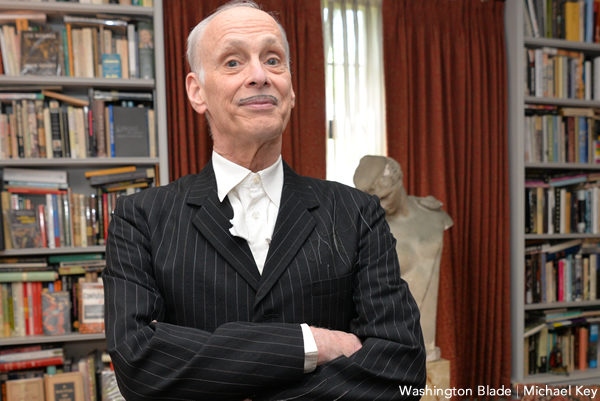
a&e features
Queer TV anchors in Md. use their platform ‘to fight for what’s right’
Salisbury’s Hannah Cechini, Rob Petree are out and proud in Delmarva
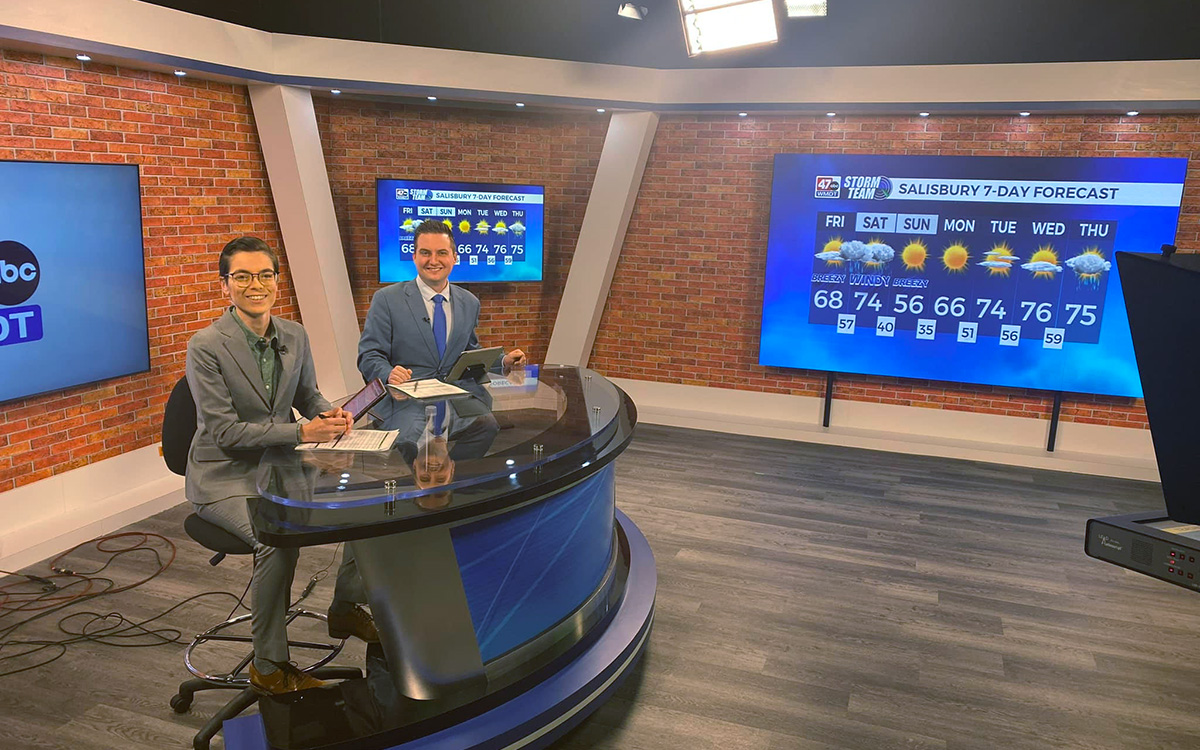
Identity can be a tricky thing for journalists to navigate. The goal of the job is to inform the public with no bias, but this is difficult, if not impossible, to do in practice. Everything from your upbringing to the books you read can impact how you view and cover the world. But sometimes these factors can help shine a light on an underrepresented community or issue.
Two broadcast journalists in Salisbury, Md., are using the subtle, yet impactful choice of sharing their queer identities to strengthen their reporting and connection to the community.
Hannah Cechini, who is non-binary, and Rob Petree, who is gay, co-host the 5:30-6:30 p.m. newscast for WMDT 47. They are the only known anchor team that are not only both queer, but also open out about their identities on air and, as Petree put it, “always use [their] platform and power that [we] have to fight for what’s right.”
Cechini’s passion for journalism played an important role in the discovery of their gender identity. They knew they were meant to be in the newsroom before they figured out they were non-binary.
“I was doing this job before I started to identify as non-binary,” Cechini told the Blade. “I’d always watch the evening news with my dad growing up and thought it was the coolest thing. And throughout high school, I worked on the school paper.”
After graduating from Suffolk University in Boston, Cechini’s passion for journalism only grew as they began to work in the world of news media, eventually ending up in Salisbury. As they honed their writing, editing, and anchoring skills at WMDT, Cechini also started to take an introspective look into their gender identity.
A little more than two years ago Cechini came out as non-binary to their coworkers in the newsroom and was met with support all around. “It was definitely smoother than I anticipated,” they said.
“It is very freeing to be able to do this job as a non-binary person because I haven’t really seen much of that representation myself.”
Petree, on the other hand, knew he was gay right around the same time he became interested in news media, at age 14. He started working for his high school news show and used it as a way to be open about his sexuality rather than hide it.
“I broke into broadcasting doing the morning announcements,” he said. “I did the weather and started doing a segment called issues and insights,” Petree said, explaining his introduction to the news. Eventually, students would ask him questions about his sexuality after seeing him on the school TV. “It had gotten to the point in school, that if you’re going to come up and ask me if I’m gay, well shit, I’m going to tell you!”
To him, this was the exact reason he had come out. Petree wanted to motivate others to live honestly.
“There are a lot of people who will spend most of their lives not being out so if they can see someone like me, who’s out and proud doing his thing, so to speak, then maybe that’s the inspiration for them,” Petree said. “To search their own soul, find out who they are, and live their full life.”
Petree explained that he got his start in a space that was not always welcoming to his queerness. This tested the delicate balance between being a journalist and holding your identity close.
“I’ve always been out and it was a challenge because I got my start in conservative talk radio,” Petree said. “I’m going to be honest, some of the things I heard from people I’ve worked with, from the callers to the radio stations were absolutely abhorrent. But I never let it discourage me. It made me work that much harder.”
Cechini highlighted the same sentiment when explaining why it’s important to have out LGBTQ figures in news media. They want to show everyone that it is possible to be openly queer and successful.
“I just think that representation matters because if ‘Joe,’ who’s never seen a transgender person before, sees a transgender person or a non-binary person, doing a job that they’ve only ever seen straight cis people doing before, it kind of creates that understanding or bridges that gap,” Cechini said. “It’s like, ‘OK, maybe they’re not that different from me.’ And that facilitates being able to connect among different communities.”
Both Cechini and Petree agree that having a queer coworker has made their bond stronger.
“It’s great to have someone else next to me who I can relate to and work alongside,” Petree said. “And they’re a joy to work with, they really are. There is a tremendous amount of things that we relate to together — like we both share and have the same affinity for Lady Gaga,” he said laughing. “Although they’re more of a Lady Gaga fan than I am.”
“Hannah is a tremendous journalist who really goes out of their way to make sure that the stories that they do are on point 100% of the time,” he added. “They’ve been great to work with and to learn from and to grow alongside. I’m very happy to have them as my co-anchor.”
Cechini explained that the relationship between two co-anchors can make or break a newscast, and having Petree as their partner on air is a major part of the show’s success.
“Co-anchoring is not just the relationship that you have on camera,” Cechini said. “It’s really, really important to have a good relationship with your co-anchor off-camera as well because you have to have a level of trust between you.”
Cechini continued, saying that this relationship is crucial to working together, especially when things don’t go as planned.
“Not everything always goes to script,” they said. “Sometimes you have to be able to work together without even really talking to each other and just kind of know what to do. When you have a relationship like that with someone who identifies similarly to you or has had similar life experience, I think that just only strengthens that [relationship].”
Although they have had similar experiences being from the LGBTQ community, Petree said it was a change for him to use “they/them” pronouns on air.
“Prior to working with Hannah, I’ve never worked with a non-binary individual who went by the pronouns ‘they/them,’” Petree said. “It was new for me to not use traditional pronouns on air, but I can say that I have never misgendered them on air and never will. You get conditioned to using traditional pronouns and it’s easy to make that mistake, but I never have.”
At the end of the day, they both explained, it is about doing the job right. For the duo, a part of that is understanding the diversity of people and issues in the community.
“When you come from a more marginalized community, I think that kind of helps to inform you a little better as a journalist because you have a better understanding of what it’s like to be ‘the other guy,’” Cechini said.
“Our talent and our drive for journalism speaks for itself,” Petree said. “And that resonates with people. Have we shown ourselves to be an inspiration to the LGBTQ+ community here in Delmarva? Yes, we have. And that’s something that I’m proud of.”
The primetime nightly newscast with Hannah Cechini and Rob Petree airs weeknights from 5:30-6:30 p.m. on ABC affiliate WMDT 47.
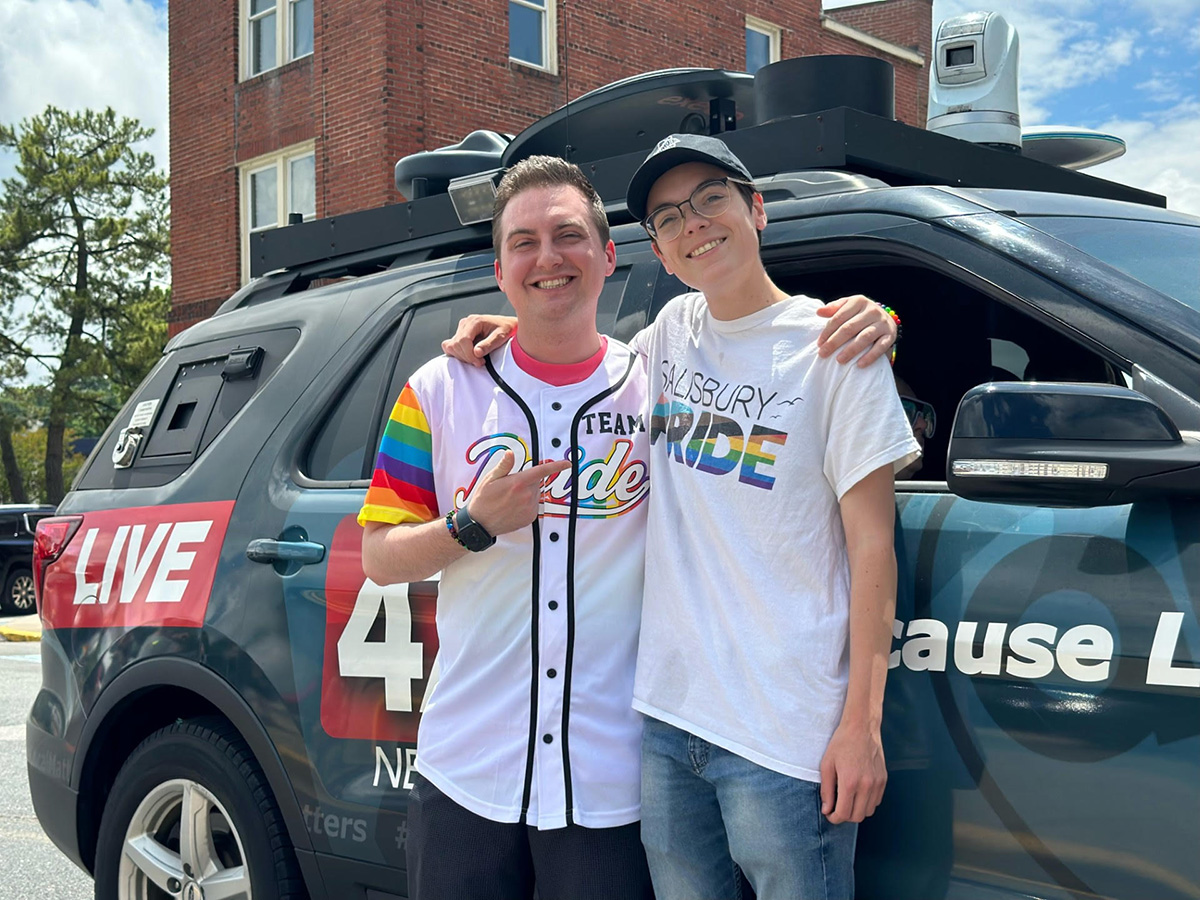
a&e features
‘Queering Rehoboth Beach’ features love, loss, murder, and more
An interview with gay writer and historian James T. Sears
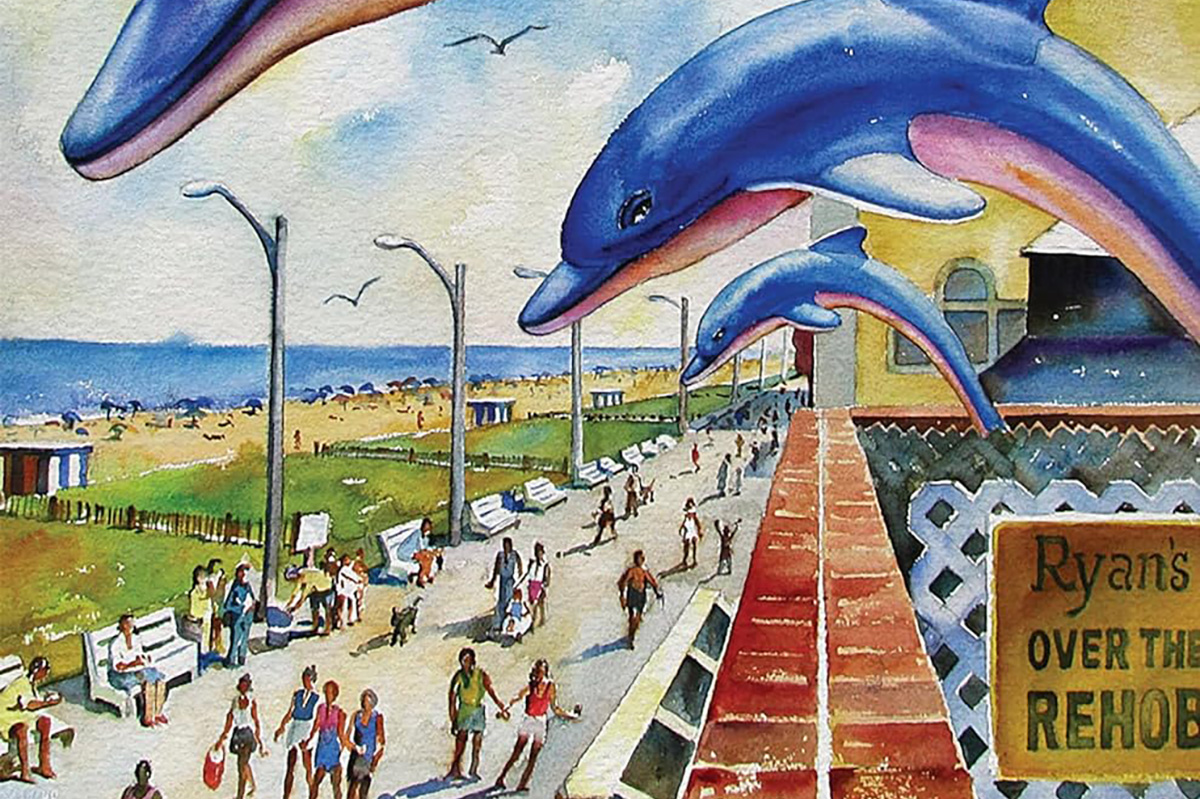
James T. Sears book talk
Saturday, June 29, 5 p.m.
Politics & Prose
5015 Connecticut Ave., N.W.
When it comes to LGBTQ summer destinations in the Eastern time zone, almost everyone knows about Provincetown, Mass., Fire Island, N.Y., and Key West, Fla. There are also slightly lesser known, but no less wonderful places, such as Ogunquit, Maine, Saugatuck, Mich., and New Hope, Pa. Sandwiched in between is Rehoboth Beach, Del., a location that is popular with queer folks from D.C., Maryland, Virginia, Pennsylvania, and New Jersey. The dramatic and inspiring story of how Rehoboth Beach came to be what it is today can be found in gay historian James T. Sears’s revealing new book “Queering Rehoboth Beach: Beyond the Boardwalk” (Temple University Press, 2024). As educational as it is dishy, “Queering Rehoboth Beach” provides readers with everything they need to know (and possibly didn’t realize they needed to know) about this fabulous locality. Sears was kind enough to make time to answer a few questions about the book.

WASHINGTON BLADE: James, it’s been a few years since I’ve interviewed you. The last time was in 1997 about your book “From Lonely Hunters to Lonely Hearts: An Oral History of Lesbian and Gay Southern Life.” At the time, you were living in Columbia, S.C. Where are you currently based, and how long have you been there?
JAMES T. SEARS: It has been great reconnecting with you. After that book, we moved to Charleston, S.C. There I wrote several more books. One was about the Mattachine group, focusing on one largely misunderstood leader, Hal Call. Another book shared reminisces of a 90-year-old gentleman, the late John Zeigler, interweaving his diaries, letters, and poetry to chronicle growing up gay in the South at the turn of the last century. From there I moved to Central America where I chronicled everyday queer life and learned Spanish. We returned several years ago and then washed up on Rehoboth Beach.
BLADE: In the introduction to your new book “Queering Rehoboth Beach: Beyond the Boardwalk” (Temple University Press, 2024), you write about how a “restaurant incident” in Rehoboth, which you describe in detail in the prologue, became a kind of inspiration for the book project. Please say something about how as a historian, the personal can also be political and motivational.
SEARS: I want to capture reader’s interest by personalizing this book more than I have others. The restaurant anecdote is the book’s backstory. It explains, in part, my motivation for writing it, and more crucially, introduces one meaning of “queering Rehoboth.” That is, in order to judge this “incident”—and the book itself—we need to engage in multiple readings of history, or at least be comfortable with this approach. I underscore that what is accepted as “history”—about an individual, a community, or a society—is simply a reflection of that era’s accepted view. Queering history challenges that consensus.
BLADE: Who do you see as the target audience for “Queering Rehoboth Beach?”
SEARS: Well, certainly if you have been to Rehoboth or reside there, this book provides a history of the town—and its queering—giving details that I doubt even locals know! Also, for those interested in the evolution of other East Coast queer resorts (Ptown, Fire Island, Key West) this book adds to that set of histories. My book will also be of interest to students of social change and community organizing. Most importantly, though, it is just a good summer read.
BLADE: “Queering Rehoboth Beach” features numerous interviews. What was involved in the selection process of interview subjects?
SEARS: I interviewed dozens of people. They are listed in the book as the “Cast of Narrators.” Before these interviews, I engaged in a systematic review of local and state newspapers, going back to Rehoboth’s founding as a Methodist Church Camp in 1873. I also read anecdotal stories penned by lesbians and gay men. These appeared in local or regional queer publications, such as Letters from CAMP Rehoboth and the Washington Blade. Within a year, I had compiled a list of key individuals to interview. However, I also interviewed lesbians, gay men, transgender individuals, and heterosexuals who lived or worked in Rehoboth sometime during the book’s main timeframe (1970s-2000s). I sought diversity in background and perspective. To facilitate their memories, I provided a set of questions before we met. I often had photos, letters, or other memorabilia to prime their memories during our conversation.
BLADE: Under the heading of the more things change, the more they stay the same, the act of making homosexuality an issue in politics continues to this day. What do you think it will take for that to change?
SEARS: You pose a key question. Those who effectuated change in Rehoboth — queers and progressive straights — sought common ground. Their goal was to integrate into the town. As such, rather than primarily focus on sexual and gender differences, they stressed values held in common. Rather than proselytize or agitate, they opened up businesses, restored houses, joined houses of worship, and engaged in the town’s civic life.
To foster and sustain change, however, those in power and those who supported them also had to have a willingness to listen, to bracket their presuppositions, and to engage in genuine dialogue. Violent incidents, especially one on the boardwalk, and the multi-year imbroglio of The Strand nightclub, gradually caused people to seek common ground.
That did not, however, come without its costs. For some — long separated from straight society — and for others — unchallenged in their heteronormativity — it was too great of a cost to bear. Further, minorities within the queer “community,” such as people of color, those with limited income, and transgender individuals, never entered or were never invited into this enlarging public square.
The troubles chronicled in my book occurred during the era of the “Moral Majority” and “Gay Cancer.” Nevertheless, it didn’t approach the degree of polarization, acrimony, fake news, and demagoguery of today. So, whether this approach would even be viable as a strategy for social change is debatable.
BLADE: In recent years, there has been a proliferation of books about LGBTQ bars, a subject that is prominent in “Queering Rehoboth Beach.” Was this something of which you were aware while writing the book, and how do you see your book’s place on the shelf alongside these other books?
SEARS: Queering heterosexual space has been a survival strategy for generations of queer folks. These spaces — under-used softball fields, desolate beaches, darkened parks, and out-of-the-way bars — are detailed in many LGBTQ+ books, from the classic, “Boots of Leather, Slippers of Gold,” to the recently published “A Place of Our Own” and “The Bars Are Ours.” Of course, these spaces did not encompass the kaleidoscope of queer life, but they provide us a historical gateway into various segments of a queer community and culture.
This was certainly true for my book. Unsurprisingly, until The Strand controversy, which began in 1988, all of Rehoboth’s queer bars were beyond the town limits. There were, however, homosexual watering holes in the liminal sexual space. For instance, you had the Pink Pony on the boardwalk during the 1950s and the Back Porch Café during the 1970s. So, in this sense, I think “Queering Rehoboth Beach” fits well in this ever-enlarging canon of queer history.
BLADE: As one of the most pro-LGBTQ presidents in U.S. history, how much, if it all, did the Biden Delaware connection have to do with your desire to write “Queering Rehoboth Beach?”
SEARS: It is just a coincidence. Interestingly, as I was researching this book, I came across a 1973 news story about Sen. Joe Biden speaking at a civic association meeting. One of the 30 or so residents attending was James Robert Vane. The paper reported the senator being “startled” when Vane questioned him about the ban on homosexuals serving in the U.S. civil service and military. Uttering the familiar trope about being “security risks,” he then added, “I admit I haven’t given it much thought.” In Bidenesque manner, he paused and then exclaimed, “I’ll be darned!”
Biden was a frequent diner at the Back Porch Café, often using the restaurant’s kitchen phone for political calls. Like the progressives I spoke about earlier, he had lived in a heteronormative bubble—a Catholic one at that! Yet, like many in Rehoboth, he eventually changed his view, strongly advocating for queer rights as Vice President during the Obama administration.
BLADE: How do you think Rehoboth residents will respond to your depiction of their town?
SEARS: Well, if recent events are predictive of future ones, then I think it will be generally positive. My first book signing at the locally owned bookstore resulted in it selling out. The manager did tell me that a gentleman stepped to the counter asking, “Why is this queer book here?”— pointing to the front table of “Beach Reads.” That singular objection notwithstanding, his plan is to keep multiple boxes in stock throughout the summer.
BLADE: Over the years, many non-fiction and fiction books have been written about places such as Provincetown, Fire Island, and Key West. Is it your hope that more books will be written about Rehoboth Beach?
SEARS: My hope is that writers and researchers continue to queer our stories. Focusing on persons, events, and communities, particularly micro-histories, provides a richer narrative of queer lives. It also allows us to queer the first generation of macro-histories which too often glossed over everyday activists. So, as the saying goes, let a thousand flowers bloom.
BLADE: Do you think that “Queering Rehoboth Beach” would make for a good documentary film subject?
SEARS: Absolutely, although probably not on the Hallmark Channel [laughs]! It would make an incredible film — a documentary or a drama — even a mini-series. Because it focuses on people: their lives and dreams, their long-running feuds and abbreviated love affairs, their darker secrets, and lighter moments within a larger context of the country’s social transformation. “Queering Rehoboth Beach” details the town’s first gay murder, the transformation of a once homophobic mayor, burned-out bars, and vigilante assaults on queers, the octogenarian lesbian couple, living for decades in Rehoboth never speaking the “L word,” who die within months of one another. It, too, is a story of how the sinewy arms of Jim Crow affected white Rehoboth — gay and straight. In short, “Queering Rehoboth Beach” is about a small beach town, transformed generation over generation like shifting sands yet retaining undercurrents of what are the best and worst in American life and culture.
BLADE: Have you started thinking about or working on your next book?
SEARS: The manuscript for this book was submitted to the publisher more than a year ago. During that time, I’ve been working on my first book of fiction. It is a queer novel set in early nineteenth century Wales against the backdrop of the Napoleonic wars and industrialization. I want to transport the reader into an era before the construction of homosexuality and at the inception of the women’s movement. How does one make meaning of sexual feelings toward the same gender or about being in the wrong gender? In the process of this murder mystery, I integrate Celtic culture and mythology and interrogate how today’s choices and those we made in the past (and in past lives) affect our future and those of others.
The Blade may receive commissions from qualifying purchases made via this post.
a&e features
D.C. Latinx Pride seeks to help heal the community
Much history lost to generations of colonialism
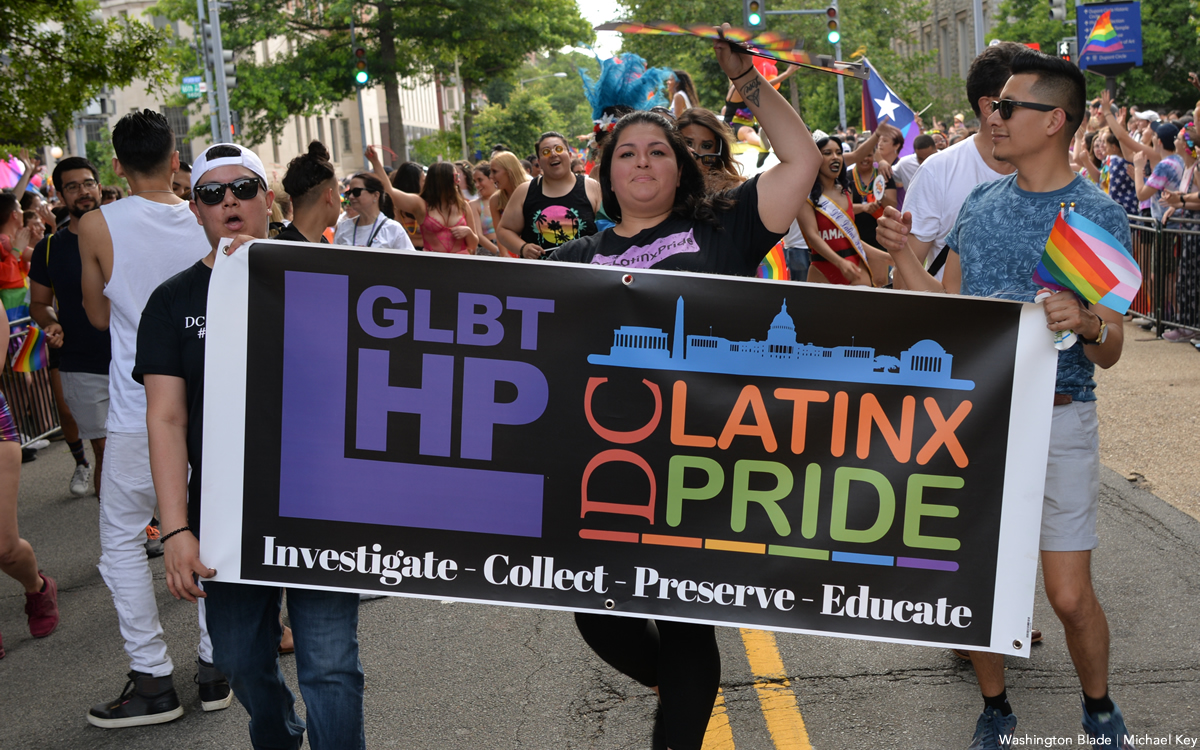
The Latinx History Project will host its 18th annual Latinx Pride with a series of 11 events this year.
Latinx History Project, or LHP, was founded in 2000 to collect, preserve and share Latinx LGBTQ+ History. Six years later, they began hosting DC Latinx Pride.
Board member Dee Tum-Monge said organizers saw a need for the event that centered Latinx community members.
“LHP knows our queer history as Latinx folks has most often been lost to generations of colonialism and imperialism,” they said. “Which is why we focus on documenting and highlighting the impact our community has in D.C. and beyond.”
According to UCLA School of Law, there are more than two million Latinx LGBTQ adults that live in the U.S.
“Events specifically for the Latinx community are important not only to make our experience visible but also to create spaces where we can grow closer with other groups and each other,” said Tum-Monge.
This year they kicked off DC Latinx Pride with a crowning ceremony for their royal court on May 31.
Their three-part series, “La Sanación”, is underway with part two planned for June 16.
“Sanación in Spanish means ‘healing’ which is a big part of what we want to bring to Pride,” said Tum-Monge. “Our communities go through a lot of trauma and hate, but we know there’s more to us. Our goal is to foster connection with ourselves, nature, community, and spirituality.”
In conjunction with the series there is a slate of other events; tickets can be purchased at latinxhistoryproject.org/pride.
In addition, Latinx Pride will march in the Capital Pride Parade on Saturday and participate in the festival on Sunday. To stay involved with Latinx History Project after Pride and hear more about future events visit latinxhistoryproject.org.
-

 Canada24 hours ago
Canada24 hours agoToronto Pride parade cancelled after pro-Palestinian protesters disrupt it
-

 Politics5 days ago
Politics5 days agoLGBTQ issues absent from Trump-Biden debate
-

 Theater4 days ago
Theater4 days agoStephen Mark Lukas makes sublime turn in ‘Funny Girl’
-

 Baltimore3 days ago
Baltimore3 days agoDespite record crowds, Baltimore Pride’s LGBTQ critics say organizers dropped the ball

